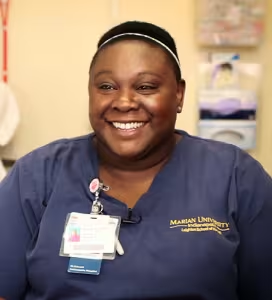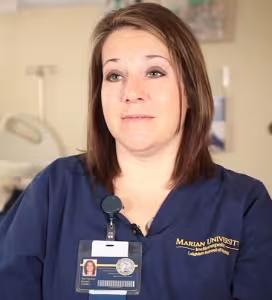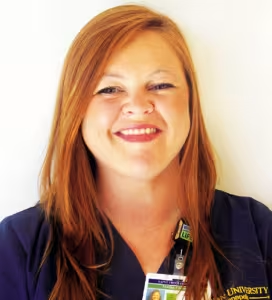Why I Became a Nurse: Second-Degree Students Share Their Stories
Each blog post is dated and contains accurate information as of that date. Certain information may have changed since the blog post publication date. If you would like to confirm the current accuracy of blog information, please visit our ABSN overview page or contact admissions at 866.892.6463.

Between studying for exams and going through skills labs and clinicals, nursing school isn’t for the faint of heart. Throw on top of that an accelerated graduation timeline and you’re in for a demanding road ahead to complete your nursing degree.
In the most arduous moments, you may even be asking yourself, “Why do I want to become a nurse in the first place? Is it worth all the stress and sacrifices to my schedule?”
Below, we share the “why I became a nurse” stories of three students to serve as a reminder that yes, it is. In most cases, the road to nursing wasn’t always direct or easy for them as their careers didn’t begin in the medical field, but once it led to Marian University’s Accelerated BSN program, they felt supported in their journeys.
Read their stories and remember: you’re putting yourself through the stress of accelerated nursing school for a reason — because nursing is work worth doing.
Adanna Williams: Holistic approach to medicine
Why she became a nurse

Adanna completed her undergraduate degree in psychology, but after some time in the workforce decided to switch gears and pursue a graduate degree in social work. Once she started down that path, however, it didn’t take her long to realize that it just wasn’t for her either.
Not sure of what to do next, she took an indefinite leave of absence and moved to Utah to join the Church of Jesus Christ of Latter-day Saints. Experiences she had helping an elderly patient during a mission helped her overcome her fears of handling bodily fluids and realize she wanted to become a nurse.
“It helped me to see a part of myself that was holding me back from pursuing nursing,” she says. “So, when I came back from my mission, I started to pursue it and I found this program.”
What reaffirmed her decision
Since enrolling in Marian University’s ABSN program in Indianapolis, she’s often felt reassured that she made the right decision to become a nurse.
One special moment came during her first medical-surgical clinical, when she helped a depressed pancreatitis patient who initially refused help leave her bed, take a bath, and take a walk.
“Once she did that, then I said ‘you’ve been such a trooper, I’m going to stay and do your hair.’ And so, I put them in two French braids … So we just started talking and it made me feel good that she felt better,” she says. “The nurse was amazed. She was like, ‘How did you get her to do all of that?’ I think showing that I cared about her helped her to open up.”
Amy Harmon: Positive impact on patients and community
Why she became a nurse

Coming from a family of educators, becoming a teacher made sense to Amy, who always had the professional goal of making a difference in people’s lives. So after college graduation, she spent 14 years working as a fourth- and fifth-grade teacher in a public school system. While she loved her job, she always wondered “what if?” to the other path she considered all those years ago — nursing.
“Nurses amaze me,” she says. “The knowledge that they have, I mean, they’re saving lives, they’re taking care of babies, they’re taking care of the elderly, they’re taking care of the sickest of the sick and putting others first. I’ve always wanted to work with people.
“At 18, I was like ‘well I don’t know if I can do that.’ But, you get some life lessons in, some life experiences, and realize you can.”
At 36 and with three kids, she admits the decision to leave her full-time job to enroll in accelerated nursing school at Marian University seemed scary, but working with her academic advisor helped put her at ease.
“The more I talked to the academic advisor that I worked with, I just felt very comfortable,” she says. “They made it so easy, and that’s what I needed. I didn’t have time for a lot of digging into what classes do I take next, or what do I do. They lay it out there for you, and it’s like, ‘Here it is, go get it.’”
What reaffirmed her decision
Similar to the trepidation she had to pursue nursing as a second career, Amy felt anxious right before her first experience interacting with a patient during clinicals. But, once she did it, she realized that with the skills training she received in the program she made the right decision to become a nurse.
“I remember standing outside my patient’s door for just a minute and staring at the door and thinking ‘OK, I’m doing this. I’m actually going into a patient’s room and I’m going to get their vital signs for a nurse.’ I went in, did it, and it was awesome! I made a great relationship with that patient.”
She also credits the clinical aspect of the program for increasing her confidence as a nurse and giving her the experience to excel in her new profession.
“I think that you don’t have a true grasp of what nursing really is until you have been in clinicals and you’ve kind of walked in their shoes with them for a little bit,” she says. “It will be the deciding factor for you if you can do that or not, if it’s the career for you.”
Amy Puckett: Flexibility and support
Why she became a nurse

Amy Puckett also took a winding road to become a nurse, which started with an interest in the funeral industry her sophomore year of studying public relations at Western Kentucky University after her grandmother fell ill and died. That experience led her to enroll in mortuary school in Nashville after completing her undergraduate degree.
Her first job out of mortuary school involved close communication with hospital physicians and nurses to coordinate the delivery of organs for transplant patients. A series of other family illnesses and time spent in hospitals also contributed to her move further down the path of enrolling in nursing school.
Nurses are the glue that holds a medical situation together. They’re the pulse of the hospital. I’m very passionate about it and very fortunate that I have the opportunity to do it now.
What reaffirmed her decision
While Amy always had the passion for health care and nursing, she says she questioned whether she could handle a rigorous nursing school schedule.
Her research led her to Marian University’s ABSN program, which piqued her interest because its online-based format would allow her to continue working while completing her prerequisites through Marian’s Adult Programs (MAP).
Even with finding the perfect program for her, she still doubted her ability to turn her passion into a profession. An online conversation with a representative prompted her to apply.
“They were just wonderful,” she says. “They answered all my questions and made me feel like, ‘you can do it.’”
That initial encouragement didn’t wane once she enrolled. She credits everyone in the program, including the office staff, fellow members of her cohort, and instructors for making her feel like pursuing her passion was a worthwhile pursuit.
I feel so supported, I feel so inspired, and they’re there to make it as easy and painless as possible, because the material is hard, and it’s fast-paced. But I think I made the absolute best choice for myself to start at Marian University.
Why do you want to become a nurse?
If you’re passionate about nursing, you owe it to yourself to explore your nursing school options like the students profiled above. You don’t have to have a background in the medical field to enroll in our 16-month ABSN program — all it takes is a bachelor’s degree and the desire to make it happen. We can help you complete the prerequisites through MAP before you begin.
Contact one of our admissions representatives to learn how you can begin down the road toward a rewarding career as a nurse through Marian University’s ABSN program.
